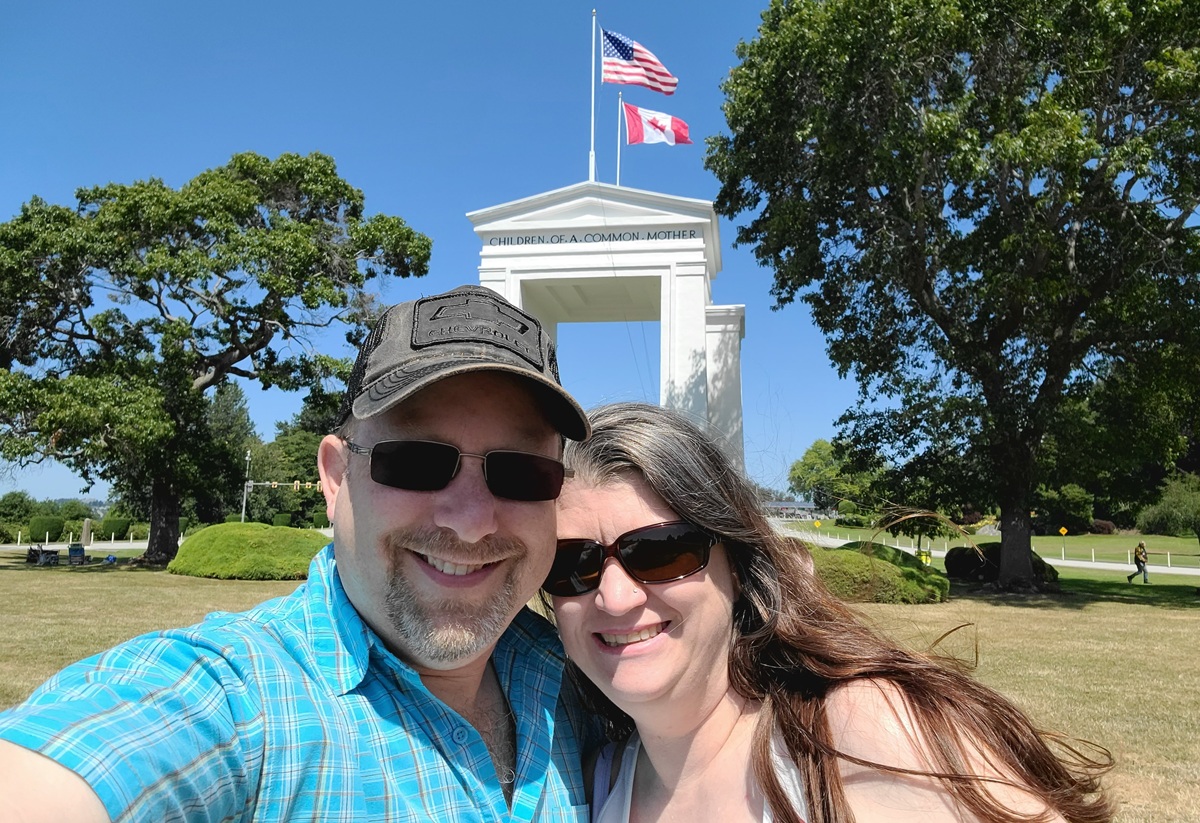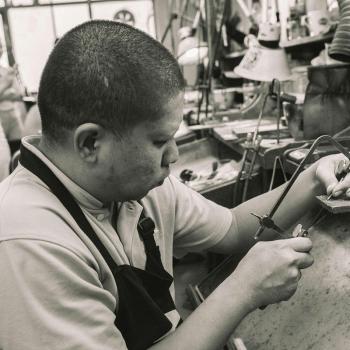I live on one side of the US/Canada border and work on the other. Because of my commute, people often ask about my border experience.

I think about borders more than most people. I am an American, living in Canada. Growing up in the US South, I never thought anyone would call me a Yankee. But up here I get it a lot, mostly with good-natured ribbing. Honestly, though, I don’t see much difference from one country to the next. Both are beautiful places filled with amazing people. To me, borders feel kind of silly.
A Cross-Border Marriage
I started crossing the border a few years ago when I started dating the incredible woman I eventually married. We had two weddings, one in Virginia and one in British Columbia. Borders and distance prevented our two families from celebrating together. Strange as it is, years later, none of them have met face to face. So, borders do seem to keep people apart. Though, it doesn’t make sense to me.
Gods of the Guardhouse
After we married, I applied for permanent residency in Canada. During that time, border guards kept a close eye on my comings and goings. Until my PR was granted, I could visit Canada, but I couldn’t be there “too much,” or stay “too long.” They had the right to refuse me entry into the country—and they exercised that right a couple of times, when they assumed I was trying to get away with something.
I remember how frustrating it was when the whim of a border guard kept me away from my wife for two months. Border rules aren’t always clear-cut. It really is up to the individual guard’s discretion. Most are wonderful—but a few consider themselves the gods of the guardhouse.
Now that I have permanent residency, they can no longer legally turn me away. Entering the US, I am welcomed as a citizen. Entering Canada, I am also welcomed home. And that’s a good feeling.
The Border During COVID
COVID Times were especially frustrating. I had applied for permanent residency, but it had not yet been granted. So, my wife and I had to remain on separate sides of the border. During that transitional time, I lived in our RV for nine months at a border town.
When I was allowed to enter Canada for a visit we were required to quarantine for two weeks before emerging into the “real world.” As my job would only allow me to work remotely for a limited time, I only had a weekend reprieve before employment forced me back to the States. Then, I had to quarantine for another week before I could return to work face-to-face. Fortunately, because I was an essential worker, I was allowed to cross for work. Otherwise, there would have been no visits at all.
So, I passed two weeks in Canadian quarantine, one week in US quarantine, and then a month working in the office. Then, I would repeat the cycle. This way, I spent three weeks out of every seven in quarantine, either in Canada or America.
Ditch Visits at the Border
During COVID, you may have seen on the news that some couples found ways around border restrictions. One way was to visit each other at the border. Meaning that we found a Canadian road that ran east-west, parallel to a US road. The ditch between these two roads was the actual border.
Way out in the country, there were no checkpoints or guarded gates. There were just markers with the occasional guardrail or knee-high cable fence between the two countries. Of course, cameras watched every nook and cranny along the border, and guards occasionally stopped in to say hello. But we could set up lawn chairs and picnic tables. As long as we didn’t set a foot across the border, we could visit all day.
Love Knows No Borders
Then, there was Peace Arch Park, the one place in the US where Americans and Canadians could meet without COVID restrictions (for better, or for worse). Due to an old treaty, the park could not be shut down. So, you can bet we took advantage of this loophole. As did thousands of others during COVID. Once we discovered the park, which was close to us, we visited regularly. And it seemed there was a wedding there almost every weekend. Because love knows no borders.
Borders are Not Natural
Still, I remember thinking how stupid it all was when the sun would set, and we had to go home. She’d pack the picnic and head north, and I would turn toward the south. Geese overhead honked their condolences, reminding us that nothing impeded their travel.
Why could birds cross freely and I could not? Because borders are not natural. They are a human invention, preventing humans from crossing. They establish human territories with human boundaries. Animals care nothing for borders because borders care nothing for them.
Without Borders, There Would Be No Aliens
Borders are invisible and arbitrary lines between countries. They aren’t real things—except in our minds. And if they weren’t in our minds, we wouldn’t need to build fences and walls with guards and gates. Without othering others, there would be no borders. Without borders, there would be no aliens. And without aliens, there would be no alienation.
I am the same person after getting Permanent Residency in Canada as I was before. I am subject to the same laws, whether I’m an alien, permanent resident, or citizen. The only difference is that a human-made government has told me I can live here, whereas before it hadn’t. Now, I can call Canada home.
Shortages
This makes me think about Trump’s obsession with borders. “Build that wall.” “Don’t let them in.” “Deport them.” “Hit them with tariffs.” All of these are based on an us-vs-them mentality that fears there won’t be enough to go around.
In reality, there’s plenty. If we all quit spending so much money killing each other, we’d realize that there are no shortages of food or resources. There is only a shortage of humanity and love. We don’t need to keep “them” out. Instead, we must realize that “they” are “us,” and that there is no difference anyway.
One in Christ Jesus
This is what the author of Galatians 3:28 meant when he wrote:
There is no longer Jew or Greek; there is no longer slave or free; there is no longer male and female, for all of you are one in Christ Jesus.
“One in Christ Jesus” doesn’t just mean that all Christians are one. It means that all humanity is one, just as nature is one. Just as geese fly freely in a nature without borders, so people should live and love without restrictions of locality, race, gender, religion, or any other type of identity politics. If anything, our differences should be something to celebrate, not to use as a reason to keep one another out.
Thin Places
In the Celtic worldview, many places exist where the veil is thin between this world and the next. In these “thin places,” people can experience spiritual encounters more easily. They can commune with saints, access the Divine, and feel more at one with creation. As such, these places often fill us with awe and wonder.
But what if that thinking is backward? What if the places that fill us with awe and wonder cause the veil to become thin in our individual minds? How could this happen? If the veil is all made out of ego. Inspired by an amazing location, we experience transcendence that eclipses ego and transports us to another realm where soul and spirit overcome things of the world.
If this is so, then it’s not only places that are hallowed. The people are holy as well. The boundary between this land and that land, between the sacred and profane, between who’s in and who’s out—this border becomes thin wherever we realize that God is in all of us. Then, we cannot help but treat the stranger as a friend, and the alien as family. Because each foreigner becomes an incarnation of Immanuel—God with us.














